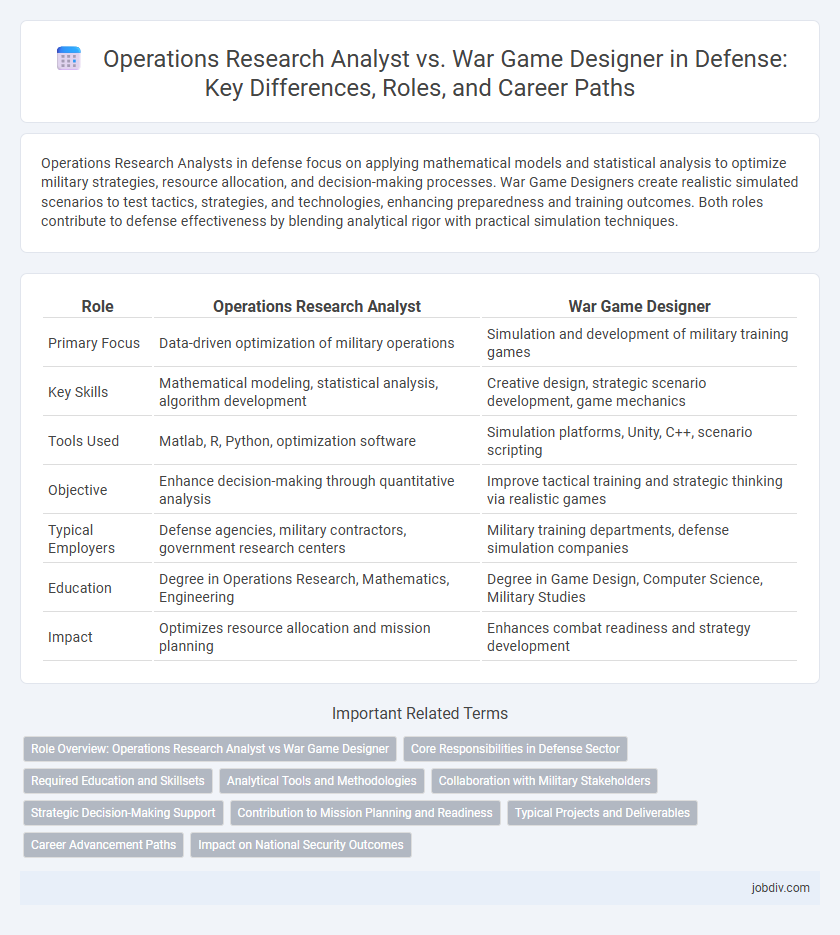Operations Research Analysts in defense focus on applying mathematical models and statistical analysis to optimize military strategies, resource allocation, and decision-making processes. War Game Designers create realistic simulated scenarios to test tactics, strategies, and technologies, enhancing preparedness and training outcomes. Both roles contribute to defense effectiveness by blending analytical rigor with practical simulation techniques.
Table of Comparison
| Role | Operations Research Analyst | War Game Designer |
|---|---|---|
| Primary Focus | Data-driven optimization of military operations | Simulation and development of military training games |
| Key Skills | Mathematical modeling, statistical analysis, algorithm development | Creative design, strategic scenario development, game mechanics |
| Tools Used | Matlab, R, Python, optimization software | Simulation platforms, Unity, C++, scenario scripting |
| Objective | Enhance decision-making through quantitative analysis | Improve tactical training and strategic thinking via realistic games |
| Typical Employers | Defense agencies, military contractors, government research centers | Military training departments, defense simulation companies |
| Education | Degree in Operations Research, Mathematics, Engineering | Degree in Game Design, Computer Science, Military Studies |
| Impact | Optimizes resource allocation and mission planning | Enhances combat readiness and strategy development |
Role Overview: Operations Research Analyst vs War Game Designer
Operations Research Analysts utilize mathematical models, statistical analysis, and optimization techniques to support military decision-making, focusing on improving resource allocation, logistics, and strategic planning. War Game Designers develop realistic simulation scenarios and models to test military strategies, tactics, and decision outcomes under varied conditions, enhancing preparedness and training effectiveness. Both roles contribute to defense strategy, with analysts emphasizing quantitative problem-solving and designers prioritizing immersive scenario-based evaluations.
Core Responsibilities in Defense Sector
Operations Research Analysts in the defense sector focus on applying mathematical modeling, statistical analysis, and optimization techniques to improve military decision-making, resource allocation, and strategic planning. War Game Designers develop realistic simulation scenarios that test military strategies, tactics, and operational effectiveness, providing valuable insights for training and preparedness. Both roles critically enhance defense capabilities by combining analytical rigor with scenario-based experimentation to support mission success.
Required Education and Skillsets
Operations Research Analysts in defense typically require a bachelor's degree in mathematics, statistics, engineering, or computer science, with strong skills in quantitative analysis, modeling, and simulation techniques. War Game Designers often hold degrees in military science, political science, or computer science, emphasizing creativity, strategic thinking, and proficiency in game theory and scenario planning. Both roles demand advanced problem-solving abilities, but Operations Research Analysts prioritize analytical software expertise, while War Game Designers focus on immersive simulation development and narrative construction.
Analytical Tools and Methodologies
Operations Research Analysts in defense employ quantitative models, statistical analysis, and optimization techniques to evaluate complex military logistics and resource allocation. War Game Designers utilize scenario-based simulations, interactive modeling tools, and behavioral algorithms to create realistic conflict environments for strategic decision-making. Both roles rely heavily on data analytics and simulation software but differ in application focus--analysts emphasize quantitative assessment, while designers prioritize immersive scenario development.
Collaboration with Military Stakeholders
Operations Research Analysts collaborate closely with military stakeholders by leveraging quantitative models to optimize resource allocation, mission planning, and strategic decision-making under complex battlefield conditions. War Game Designers engage with military personnel to develop realistic simulation scenarios that test strategies, assess risks, and evaluate potential outcomes for training and operational readiness. Both roles require deep understanding of military objectives and constraints to ensure effective communication and integration of analytical insights into defense planning processes.
Strategic Decision-Making Support
Operations Research Analysts apply mathematical modeling, statistical analysis, and optimization techniques to enhance strategic decision-making support in defense by evaluating complex scenarios and resource allocations. War Game Designers create simulated conflict environments that replicate realistic military challenges, enabling stakeholders to test strategies and predict potential outcomes in controlled settings. Both roles contribute critical insights that improve tactical and strategic planning, but Operations Research Analysts focus on quantitative data analysis while War Game Designers emphasize scenario-based experiential learning.
Contribution to Mission Planning and Readiness
Operations Research Analysts enhance mission planning and readiness by applying mathematical models and statistical analyses to optimize resource allocation, logistics, and tactical decision-making. War Game Designers contribute by developing realistic simulation scenarios that test strategic concepts, allowing military leaders to assess potential outcomes and improve preparedness. Both roles are critical in refining operational strategies and ensuring effective, data-driven decisions in defense mission planning.
Typical Projects and Deliverables
Operations Research Analysts in defense focus on optimizing logistics, resource allocation, and strategic decision-making using mathematical models and data analysis, typically delivering detailed simulation reports and efficiency improvement plans. War Game Designers create realistic conflict scenarios and simulations to test military strategies and tactics, producing interactive war game frameworks and after-action review documentation. Both roles contribute critical insights, with analysts emphasizing quantitative data solutions and designers focusing on scenario-based strategic evaluation.
Career Advancement Paths
Operations Research Analysts in defense advance by mastering data analytics, optimization techniques, and simulation modeling to influence strategic decisions and resource allocations, often progressing to senior analyst or management roles within military planning or defense contractors. War Game Designers climb the career ladder by enhancing their expertise in scenario development, artificial intelligence integration, and behavioral modeling, leading to positions such as lead designer or director of war games, shaping training protocols and strategic wargaming initiatives. Both careers emphasize interdisciplinary skills but diverge in focus, with analysts leaning towards quantitative decision support and designers towards experiential learning and tactical innovation.
Impact on National Security Outcomes
Operations Research Analysts utilize quantitative models and data analytics to optimize military strategies, resource allocation, and logistics, directly enhancing decision-making efficiency and mission success rates. War Game Designers craft realistic simulations and strategic scenarios that test and improve military readiness, training, and contingency planning, thereby identifying vulnerabilities before actual deployment. Both roles critically influence national security by refining tactical operations and ensuring adaptive responses to emerging threats.
Operations Research Analyst vs War Game Designer Infographic

 jobdiv.com
jobdiv.com